By Michele Calderon
Menekşe Ile Halil….2007-2008 Turkish television drama.
A story of true, pure, and patient love
Synopsis
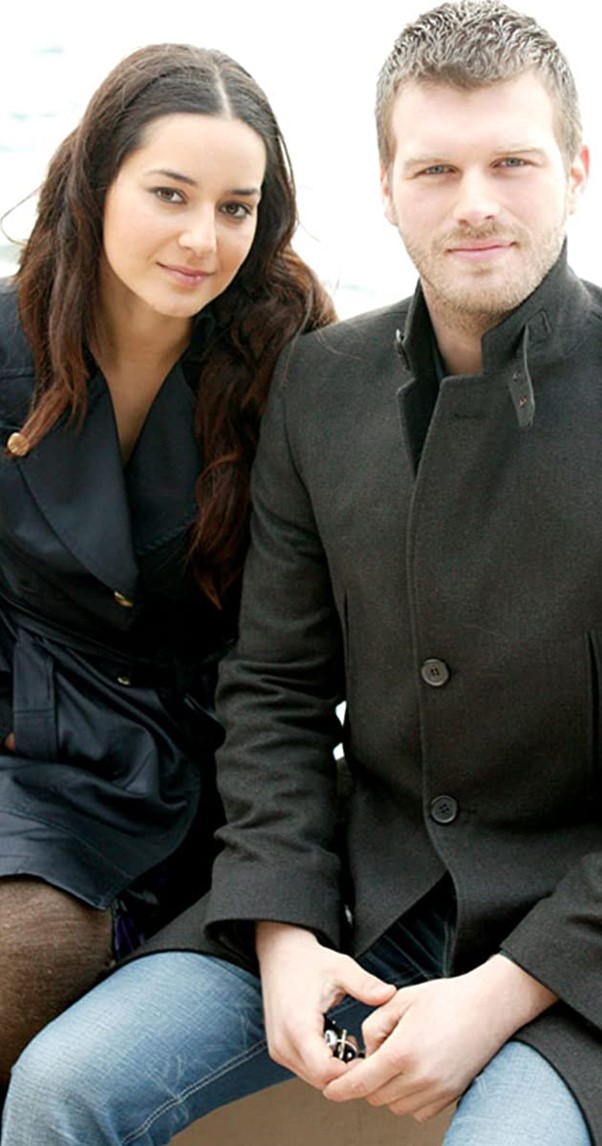
Menekşe, the daughter and youngest child of a Turkish immigrant family to Germany works in a pastry shop in Berlin. Halil, a young, handsome undocumented immigrant from Bosnia works there as well. They fall in love and theirs is a sweet, romantic and platonic relationship. But Menekse’s father has other plans for his daughter. Greedy for money to improve a financial situation strained by the demands of his small auto parts business, but mostly to support his adulterous affair with a German woman, he decides Menekse will marry Mustafa, an army buddy of his youngest son Kadir, in exchange for the sum of 25 000 Euros.
In that conservative, patriarchal family, Menekse has no voice. She must submit to her father’s edict in spite of her objection to marrying a total stranger. Desperate and ashamed, she cannot bring herself to tell the truth to Halil, who is stunned to discover his beloved is the bride when he comes to deliver the wedding cake. The wedding night is a disaster as Menekse refuses to consummate the marriage and is violently beaten by an enraged Mustafa.
With the help of her loving grandmother, Menekse makes plans to flee to Istanbul with Halil. Discovering the existence of Halil, Menekse’s father decrees she has dishonored the family (though no “improprieties” have occurred between the young couple) and orders his two sons to support Mustafa in carrying out the “honor killing” of Menekse, as well as the murder of Halil.
The story moves to Istanbul as the young couple hide from their pursuers and try to build a life with initial help from Halil’s powerful stepfather Mithat Ateş (who married Halil’s mother after the death of his father), and his childhood friend and former fiancée Zeynep, a lawyer. As the series progresses, Halil is revealed to be the only child of a Bosnian businessman and a Turkish woman, and sole heir to a vast fortune as head of the business conglomerate his father founded. Both Mithat and Zeynep initially shelter Halil and Menekşe but later become enemies as Mithat seeks to have Halil killed to appropriate his fortune, and Zeynep turns against Halil out of jealousy of his love for Menekse.
Meanwhile, Menekse’s family all move back to Istanbul as well and her father — who sees a way to benefit financially from Halil’s wealth and generosity — finally gives his consent to her divorce from Mustafa (in absentia) and remarriage to Halil.
Still relentlessly pursued by Mustafa, the young couple eventually enjoy a short period of wedded bliss, while Halil – in a powerful and emotional scene – finds out the truth about his family, before the series comes to a devastating ending tinged with a small ray of hope.
A personal review
In typical fashion for Turkish series, Menekse ile Halil has many twists and turns throughout the course of 36 episodes. I found it to be a difficult, sometimes harrowing watch. Written by female screenwriters Ece Yorenç and Melek Gençoglu based on a story by famed Turkish-British novelist Elif Şafak, the story tackles very strong themes of domestic and parental violence, forced marriage, rape, and honor killing.
Honor killing: is the murder of a family member, usually a woman, based on the belief by the perpetrator that the victim has brought shame on the family. Though incidences of honor killing have been known since Roman times, it is a practice which subsists to this day in various, mostly very conservative Muslim communities around the world, including in Turkey.
While the series provides important glimpses into the customs observed in traditional Turkish families, focusing on a tightly knit family and community life and respect for elders, in Menekse’s family the males have all the rights: the father first, then the brothers. The female members of the family have no voice of their own, with a slight exception made for the grandmother, whose word is still sometimes heard because of her age. Violence (verbal and physical) against them is the norm. Menekse’s mother is an abused wife who is fully aware of her husband’s affair and expected to accept it. Her brothers are required to monitor her comings and goings, frequently accompanying her to and from work.
The writers deserve huge credit for shining a light on these inequalities and on the unjust and terrible treatment of women in some communities.
As to the overall quality of the series, to this viewer it was often a B movie production, at times outright mediocre. The acting in secondary roles is uneven, the plot often overly melodramatic, and too much screen time was accorded to side story lines. The policemen in charge of investigating the evil deeds of Mustafa and other unsavory characters seem hopelessly clueless. The lead villain Mustafa was almost cartoonish in his psychopathic zeal, played by actor Hasan Küçükçetin in a performance both nerdy and creepy.
Credit should also be given to the writers for the way they portrayed the evolution of some of the male characters in unexpected and subtle ways: Menekse’s brother Kadir, goaded by his father and desperate for his approval, is initially a full and active participant in the pursuit and attempted murder of his sister and Halil. Yet he slowly realizes the error of his ways and rallies behind them, ultimately finding his own voice in confronting their father. In two different, very touching scenes, Kadir expresses his shame and regret and apologizes to Menekse for his actions.
In contrast Yusuf, the eldest brother, portrayed by Firat Tanis in a sensitive performance, initially resists his father’s orders and comes to Istanbul not to carry out a double murder but to protect and support his sister when he gets to understand the depth of Halil’s love and respect for her. In a beautiful scene in episode 13, he brings them together after the lovers have been separated for weeks, allowing Menekse the afternoon off alone with Halil.
Yet, when Yusuf later marries a young woman, Lale, to rescue her from a life of prostitution, he will turn into his father exploding in a righteous rage when he is led to believe, erroneously, that Lale has cheated on him.
In the layers written into the characters of Yusuf and Kadir we get a better understanding of the struggle within young men of their social and cultural backgrounds, between the weight of tradition and the belief in what is fair and right in the treatment of women.
As far as the story’s heroine, Şedef Avci in the role of Menekse seemed to lack depth and nuance in the first part of the series. Her portrayal at first struck me as mostly bland, her facial expressions when not crying usually reduced to a shy smile or mimic. From her acting in the first few episodes it was a bit difficult to understand why Halil loved Menekse as much as he did. In truth it cannot be easy finding the depth in the character of a young and innocent girl who is a victim of parental and marital abuse. To the actress’ credit, she became more natural and animated in the second half of the show, as Menekse with Halil’s support manages to put her victimhood aside and find her own voice, eventually opening her own pastry shop in Istanbul, even using her experience with trauma to support her sister- in- law who has also suffered abuse at the hands of men.
Halil the Angel
In the midst of all the violence and pain there is, however, a beautiful love story driven by the character of Halil. That story alone, of two young people fighting for their love against seemingly unsurmountable odds makes Menekse ile Halil a series worth watching, due in no small part to Kivanç Tatlitug’s beautiful portrayal of Halil.
Halil Tuglu is undeniably the sweetest, most patient, and loving character ever played by Kivanç since the beginning of his acting career. The way Halil loves Menekşe is a story for the ages. Halil courts Menekse with an optimistic and resilient nature, loving glances and a dazzling smile. His smile looking at Menekse can brighten up the darkest skies. She is all Halil sees and wants. His love is pure, steady and strong, reminiscent of Romeo’s love for Juliet in the Shakespeare play.
Menekse is Halil’s sun as Juliet was Romeo’s.
But soft, what light through yonder window breaks?
It is the east, and Juliet is the sun.
Arise, fair sun, and kill the envious moon,
Who is already sick and pale with grief
That thou, her maid, art far more fair than she. . . .
The brightness of her cheek would shame those stars
As daylight doth a lamp; her eye in heaven
Would through the airy region stream so bright
That birds would sing and think it were not night.
Halil does not climb a balcony to kiss Menekse, but he scales a hotel facade to break into her Istanbul hotel room, bursting through a glass window to rescue her from Mustafa, who has bound and gagged her and is attempting to rape her.
He also plays his harmonica to her, in many different settings: sitting behind her on the open top of the Berlin city bus; from the window of his room, above hers in the simple Istanbul hotel where they first take refuge; over the phone while Menekse is in the hospital being prepped for surgery; from the balcony of the apartment he later rents near her family’s home; and on many other occasions.
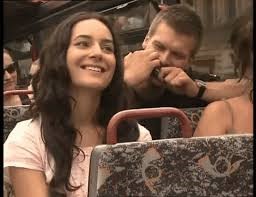
That harmonica though an inanimate object, and the sounds it emits (a hauntingly beautiful musical theme by composer Toygar Isikli) are key characters in the series, as surrogates for Halil’s love when he cannot express it directly.
The innocence, purity, and sheer beauty of that crazy in love feeling. When you think of nothing and no one else all day long but the object of your affection. The sheer joy of it: Halil radiates with joy. The energy: Halil practically flutters like a butterfly at the sight of his favorite flower. It is no small coincidence that Menekse is the Turkish word for Violet. In Halil’s one-room Berlin apartment, every surface is covered with pots of blooming violets.
That deeply passionate love of a young man for a young woman is well represented by Toygar Isikli’s theme song for the show: Ninni. And by Halil’s eyes: when asked by Yusuf how he has refrained from attempting a physical relationship with Menekse, Halil simply replies: “I love her with my eyes”.
Twenty-four year old Kivanç Tatlitug, with no silver screen experience and only one prior television series (Gümüş) under his acting belt, gave an exceptional performance as Halil. Golden Halil…with his short cropped blond hair and beard, his intensely “mavi” (blue in Turkish) eyes shining, Kivanç infused the character with a sunny optimism and a light physical energy – to portray Halil to perfection.
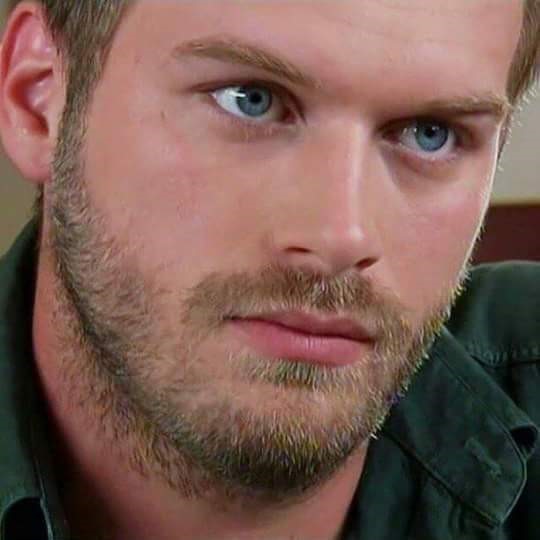
Halil and Menekse share their first true romantic kiss on the night of their engagement. Yet Kivanç’s portrayal throughout the series shows us how, as the Bryan Adams song goes, he “can see his unborn children” in Menekse’s eyes.
In my view, Kivanç carried the entire series on his — thankfully broad — shoulders. His presence and charisma on screen are evident, portending to his later roles as a dramatic actor known for his uncanny ability to portray raw emotion.
MiH was the first of Kivanç’s many collaborations with screenwriters Ece Yorenç and Melek Gençoglu who would go on to cast him in several other series: Ask’i Memnu, Kuzey Güney, Kurt Seyit ve Sura and Cesur ve Güzel.
MiH was further proof to them and many others in the Turkish film industry that Kivanç had the chops to successfully transition from modeling to a serious acting career. Said Ece in an interview: “We came across Kivanç for the first time in 2006 for Menekse Ile Halil…when writing the script we had Kivanç in mind for Halil. When we finished writing it we met for the first time to talk about Halil and it was love at first sight….We anticipated meeting someone vain…but a very kind man, eager to do good work was standing in front of me….Kivanç…proved to everyone that he wasn’t just a pretty face because he took acting seriously.”
Why did Kivanç take on this role which differed so much from his previous incarnation as Mehmet Sadoglu, scion of a rich Istanbul family in his first, highly successful series Gümüs ? I’ve come to believe it was to be a role model on how men should behave with women. When, on the night they finally marry Menekse, broken by intimate memories of prior trauma, cannot go through with physical intimacy, Halil’s behavior towards his new wife is a tutorial in what love really is: respect, selflessness, caring more about the needs and well-being of the other person than about your own needs.
Was Halil a saint? he certainly displayed deeply righteous, almost saintly qualities: integrity, kindness, empathy, generosity, but Halil was not perfect. There were times when his inherent goodness was tinged with darkness. He was often explosive in his anger, and in Kivanç’s performance we can see the struggle between his love for Menekse and his drive to avenge what she had gone through, leading him at one point to try and take justice in his own hands.
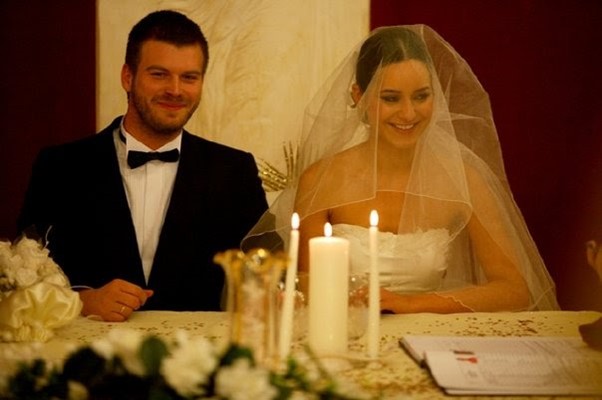
I prefer to think of Halil as an angel, who came as a harbinger of goodness to shine a light into a cruel and dark world and went back to heaven at the end – forever a strong, benevolent guardian to his Menekse, and to the new life he left her. Because of Kivanç’s portrayal, Halil lives on as a role model for how a man should love a woman.
(C) Copyright by Kivanc Tatlitug North America and Michele Calderon. No copyright infringement is intended. All video clips and photographs belong to their respective owners.
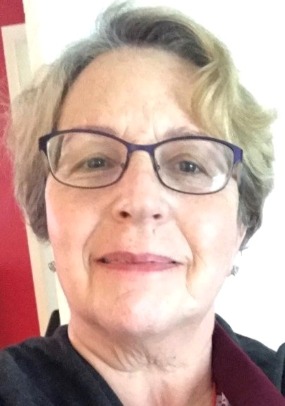
Originally from Paris, France Michele Calderon lived for over three decades in Washington D.C. while raising a son and pursuing a career in business development and international development consulting. She now resides with her husband on the Eastern Shore of Maryland near the Chesapeake Bay. In addition to writing, her passions include reading, film watching and analyzing, spending time in nature and traveling.
p.s. got so carried away talking about KT that I forgot to mention that, as you point out in this one, dizis often seem to me to incorporate social commentary. They don’t preach, but just by including real societal problems, they make a point.
Kathleen yes ! the social commentary in many Turkish drama series, often tackling very sensitive issues and themes in Turkish culture and society, is part of the draw for me and so many of us who have discovered the wonderful world of Turkish dizis !
I really appreciated this thorough and insightful review of Halil ile Menekse, which I am now watching for the first time. I was smitten by Kivanc Tatlitug when I first saw him in Kurt Seyit & Sura, and only as I looked for more of his oeuvre did I realize that despite his great beauty and graceful body (I thought he must have a background in dance!), he is truly a fine actor. I never would have thought the same actor created both Seyit and Muzaffar Tayyip Uslu (The Butterfly’s Dream) – wow! What a contrast! And I felt his performance in Hadi Be Oglum was Palme D’Or level work. Thank you again for taking the time to do this review, it really deepens my understanding of this dizi.
Kathleen — thank you so much for your kind comments on my Menekse ile Halil review ! It is so gratifying to read that it has deepened your understanding of this dizi. Indeed Kivanc is an amazing actor who has dazzled so many of us by his incredible performances from the early days of his career. He has a knack for transforming himself for each and every role he takes on. Thank you for taking the time to comment.